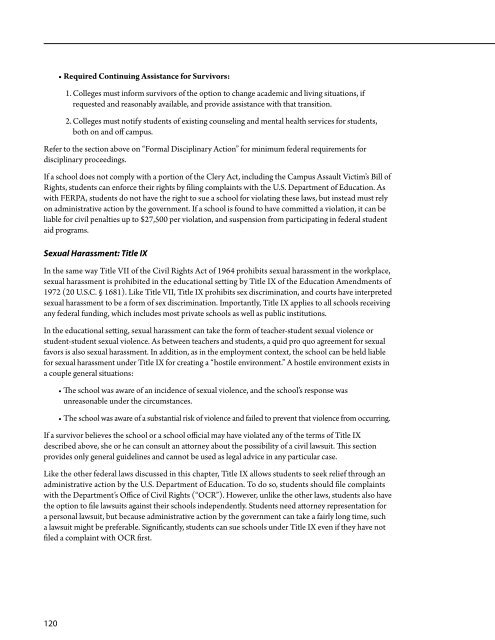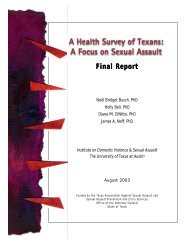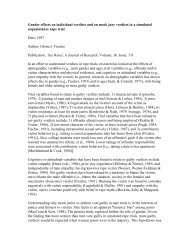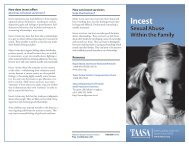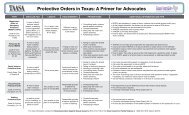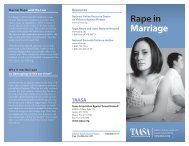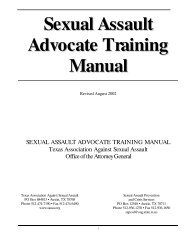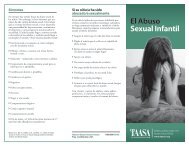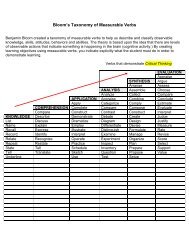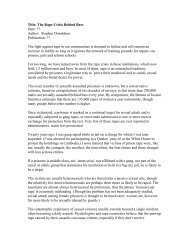Sexual aSSault LEGAL ADVOCACY MANUAL - Texas Association ...
Sexual aSSault LEGAL ADVOCACY MANUAL - Texas Association ...
Sexual aSSault LEGAL ADVOCACY MANUAL - Texas Association ...
You also want an ePaper? Increase the reach of your titles
YUMPU automatically turns print PDFs into web optimized ePapers that Google loves.
• Required Continuing Assistance for Survivors:<br />
1. Colleges must inform survivors of the option to change academic and living situations, if<br />
requested and reasonably available, and provide assistance with that transition.<br />
2. Colleges must notify students of existing counseling and mental health services for students,<br />
both on and off campus.<br />
Refer to the section above on “Formal Disciplinary Action” for minimum federal requirements for<br />
disciplinary proceedings.<br />
If a school does not comply with a portion of the Clery Act, including the Campus Assault Victim’s Bill of<br />
Rights, students can enforce their rights by filing complaints with the U.S. Department of Education. As<br />
with FERPA, students do not have the right to sue a school for violating these laws, but instead must rely<br />
on administrative action by the government. If a school is found to have committed a violation, it can be<br />
liable for civil penalties up to $27,500 per violation, and suspension from participating in federal student<br />
aid programs.<br />
<strong>Sexual</strong> Harassment: Title IX<br />
In the same way Title VII of the Civil Rights Act of 1964 prohibits sexual harassment in the workplace,<br />
sexual harassment is prohibited in the educational setting by Title IX of the Education Amendments of<br />
1972 (20 U.S.C. § 1681). Like Title VII, Title IX prohibits sex discrimination, and courts have interpreted<br />
sexual harassment to be a form of sex discrimination. Importantly, Title IX applies to all schools receiving<br />
any federal funding, which includes most private schools as well as public institutions.<br />
In the educational setting, sexual harassment can take the form of teacher-student sexual violence or<br />
student-student sexual violence. As between teachers and students, a quid pro quo agreement for sexual<br />
favors is also sexual harassment. In addition, as in the employment context, the school can be held liable<br />
for sexual harassment under Title IX for creating a “hostile environment.” A hostile environment exists in<br />
a couple general situations:<br />
• The school was aware of an incidence of sexual violence, and the school’s response was<br />
unreasonable under the circumstances.<br />
• The school was aware of a substantial risk of violence and failed to prevent that violence from occurring.<br />
If a survivor believes the school or a school official may have violated any of the terms of Title IX<br />
described above, she or he can consult an attorney about the possibility of a civil lawsuit. This section<br />
provides only general guidelines and cannot be used as legal advice in any particular case.<br />
Like the other federal laws discussed in this chapter, Title IX allows students to seek relief through an<br />
administrative action by the U.S. Department of Education. To do so, students should file complaints<br />
with the Department’s Office of Civil Rights (“OCR”). However, unlike the other laws, students also have<br />
the option to file lawsuits against their schools independently. Students need attorney representation for<br />
a personal lawsuit, but because administrative action by the government can take a fairly long time, such<br />
a lawsuit might be preferable. Significantly, students can sue schools under Title IX even if they have not<br />
filed a complaint with OCR first.<br />
120


